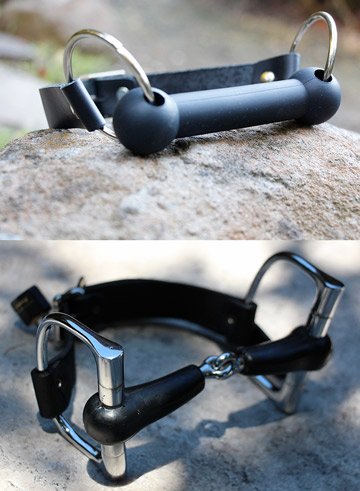
Both are bio-horse bits converted to human pony bits (via leather strap). Photo by cpony.

Both are bio-horse bits converted to human pony bits (via leather strap). Photo by cpony.
The most common bit used in ponyplay, the "rubber bit gag", is simply a real horse (bio-equine) bit with a leather strap added. Nearly every bit used in ponyplay is just a bio-equine bit (the main exception being stuffed leather bits). Why is this important? Well, it annoys me when I see some ponyplay bits (usually jointed snaffles) marketed as "real horse bits" implying that the standard "bit gag" is not a real horse bit so they can charge a premium.
Additionally, the rubber snaffle used to make the standard bit gag costs around $5 - $9, so if you don't mind a bit of leather work, you can save some money by just adding a buckle to a $5 horse bit ($4.95 from KY Horse, 2nd to last on page, or get a green, apple flavored one for $7.85).
Note: If you're interested, I have a special section devoted to harsh bits, which can be used for punishment, photo shoots, or, mostly, just for fun.
Alternatively, if your pony has a bridle without a "built-in" bit and has straps to attach a bit, then you are free to use any bit you want though do be careful of uncovered metal bits and make sure your pony's mouth can accommodate the chosen bit. In fact there are even leather wrapped bits used in the bio-equine world (below)!
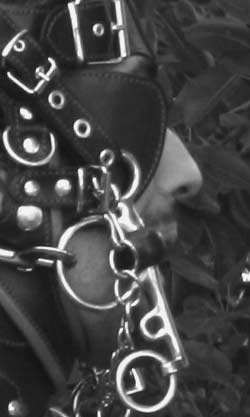
The bridle I am wearing allows my trainer to use any bio-horse bit she wants. Photo by cpony.com
In the picture to the right, I am wearing a rubber Pelham bit with 5" shanks. A Pelham bit is a type of curb bit that can generate a fair amount of leverage depending upon the length of the shanks. I can really feel this bit in my mouth, and rein pressure is dramatically amplified compared to a snaffle. The bridle I am wearing is one of the few that allows for proper use of a leverage bit. The strap on the top ring of the bit, which attaches the bit to the bridle, allows for the leverage action when reins are attached to the bottom ring (reins are not attached in this picture).
A rubber tongue port can be easily attached to nearly any bit and serves to keep your pony's tongue pressed down, preventing your pony from getting her/his tongue over the bit. In turn this prevents the pony from playing with the bit and attempting to dislodge it. A tongue curb also makes any vocalizations significantly less intelligible, which is useful if a pony likes to attempt to speak on occasion. However, a tongue curb can induce the gag reflex in some ponies. This can be prevented by cutting the tongue curb to a size more compatible with pony's mouth. A tongue curb can be purchased from most tack shops and many online tack retailers fairly cheaply (I bought mine for $0.99).
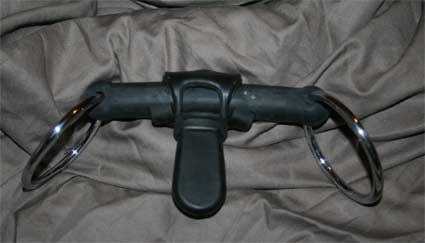
Rubber bio-horse bit with tongue curb added. This combination is very effective at preventing a human pony from getting his tongue over the bit. Photo by cpony.
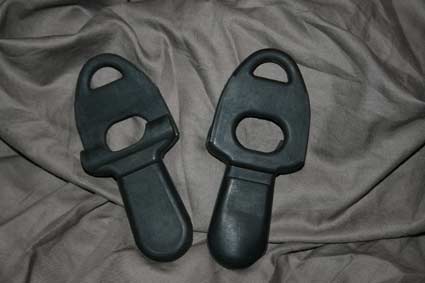
A couple rubber tongue ports (also sometimes called a juba port). They attach over nearly any bit (including the rubber bits commonly sold for pony play) and keep a pony's tongue from getting over the bit. Additionally, they make anything resembling coherent speech impossible. Photo by cpony.
Bit burrs are rubber discs that have rubber spikes on one side. The bit burrs attach to each side of the pony's bit such that the side with the rubber spikes is facing and lightly touching the pony's cheeks. When rein action is applied to one side when steering the pony, the burrs exert pressure on the cheeks of the opposite side of face. This makes it much more uncomfortable for the pony to resist the action of the reins, and will discourage your pony from leaning into either rein. Bit burrs can be purchased from tack stores for around $2-$10 each. Bit burrs are useful for ponies that have a tendency to resist the action of the reins. However, you should be careful if you decide to use them, since some bit burrs have hard rubber spikes which can damage a pony's cheeks.
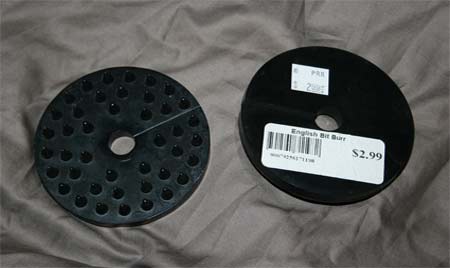
A pair of hard rubber bit burrs. Photo by cpony.
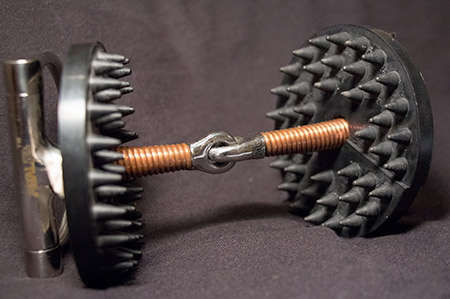
Bit with bit burrs attached. Photo by cpony.
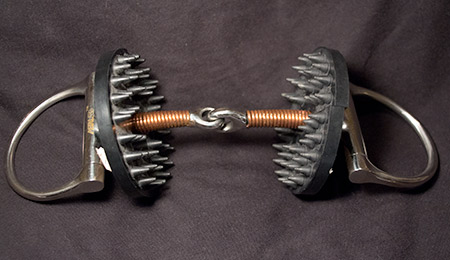
Another view of the bit with attached burrs. Photo by cpony.
Bit burrs can also be combined with tongue curbs on a pony's bit. This will make the bit very effective, but it might be too harsh for some ponies.
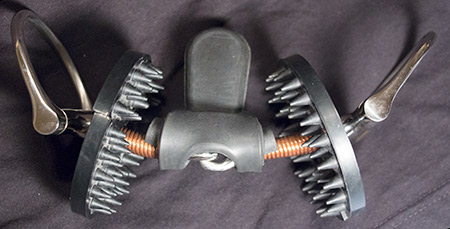
Bit with bit burrs and tongue port attached. Photo by cpony.
I also like the Happy Mouth bits. They are quite comfortable and taste pretty good (like apple) unlike some of the rubber bits. They are not metal and so are probably okay to use, but as always, be careful. Happy mouth bits also come in a variety of colors such as pink, light blue, and purple as well as styles (e.g. Pelham, jointed snaffle, etc.). You can get them from many tack stores and online tack retailers such as Dover.